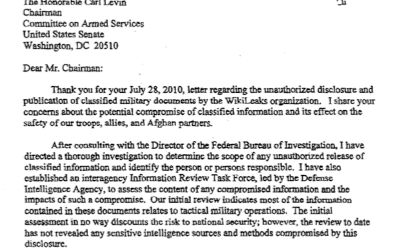
Three months after the WikiLeaks’ disclosure of 92,000 confidential US Army documents on the situation in Afghanistan, the Defense Department has admitted that these documents were worthless.
Three Atlanticist outlets, the New York Times, The Guardian and Der Spiegel, were involved in the staging of what has been portrayed as the most important information leakage in history. Meanwhile, WikiLeaks website has inflamed passions.
Voltaire Network promptly warned its readers against what seemed to be an orchestrated diversion, stressing that the documents were of minor interest and pointing to WikiLeaks’ unreliability.
Conversely, Le Monde Diplomatique, Slate and Owni devoted part of their resources to create a website dedicated to exploiting such documents.
In a letter to the chairman of the United States Senate Armed Services Committee, dated 16 August and published on 18 October, Defense Secretary Robert Gates stated that these documents relate to past field operations and that "no sensitive intelligence sources or methods were compromized by this disclosure. "
In like manner, after the Taliban spokesman, Zabihullah Mujahid, had announced that his organization was examining the documents and could punish Afghan informants cited therein, the Atlanticist media voiced fears over their elimination. Three months later, it seems that no US Army Afghan informant has been molested, their work also being considered by the Taliban as worthless.
All this once again raises the question about the credibility of the WikiLeaks site that investigative journalist Wayne Madsen has long denounced as a screen for the CIA.
==
– "Voltaire Network Communique: Wikileaks: a political diversion", Voltaire Network, 29 July 2010.
– "Something Stinks About Wikileaks Release of "Secret" Documents", by F. William Engdahl, Voltaire Network, 20 August 2010.











Stay In Touch
Follow us on social networks
Subscribe to weekly newsletter